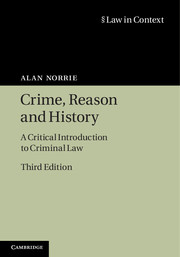Book contents
- Frontmatter
- Dedication
- Contents
- Preface to the third edition
- Preface to the second edition
- Preface to the first edition
- Table of cases
- Table of statutes
- Prologue: A brief history of the ancient juridical city of Fictionopolis
- Part I Context
- Part II Mens rea
- Part III Actus reus
- Part IV Defences
- Part V Concluding
- Bibliography
- Index
Preface to the third edition
Published online by Cambridge University Press: 05 October 2014
- Frontmatter
- Dedication
- Contents
- Preface to the third edition
- Preface to the second edition
- Preface to the first edition
- Table of cases
- Table of statutes
- Prologue: A brief history of the ancient juridical city of Fictionopolis
- Part I Context
- Part II Mens rea
- Part III Actus reus
- Part IV Defences
- Part V Concluding
- Bibliography
- Index
Summary
When I wrote the second edition, eight years had passed since the first. I scarcely imagined that the gap between that and the third would be thirteen years. On current form, a fourth edition is due in 2032.
This is not a textbook in the standard mode, which in part explains the time lags. Its underlying argument, right or wrong, is central to its significance, and permits it some leeway should the law change. Nonetheless, it was time to revisit in light of changes to the criminal law over a decade and more.
Scarcely a substantive law chapter remains unaffected. Intention has remained surprisingly stable, but recklessness abandoned Caldwell after a twenty-year ‘error’ (Chapter 4). A new offence of corporate manslaughter was enacted (Chapter 5). The law of omissions has had to be rethought in the light of the ‘preventive turn’ (Chapter 6). Causation seems to have gone back to first principles, but not perhaps in a principled way (Chapter 7). Necessity has expanded, albeit under cover and piecemeal (Chapter 8). There has been reform of diminished responsibility (Chapter 9). In sentencing, contradictory processes have led to a greater emphasis on both just deserts and incapacitation (Chapter 12). I have also added two new chapters, on self-defence and its mistaken form (Chapter 10), and on loss of control (Chapter 11).
- Type
- Chapter
- Information
- Crime, Reason and HistoryA Critical Introduction to Criminal Law, pp. xvii - xixPublisher: Cambridge University PressPrint publication year: 2014



